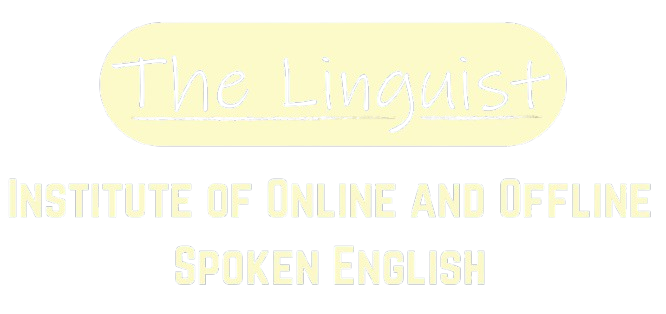
Sentences with CAN BE
The phrase “can be” is used in passive voice to show that something is possible or allowed to happen. It highlights the potential for an action to be done without focusing on who performs the action. The structure typically follows:
Can + be + past participle (V3)
For example:
1. The work can be completed by tomorrow.
(It is possible for the work to be completed.)
2. This mistake can be corrected easily.
(It is possible to correct this mistake.)
3. Can the project be finished on time?
(Is it possible to finish the project on time?)
This form is often used to discuss possibilities, permissions, or capabilities in a formal or neutral tone.
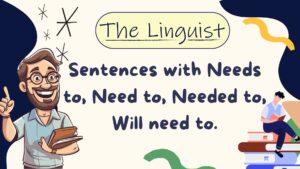
Examples with Need to
1. “Need to”:
– Expresses a present or general necessity.
– Use “do/does” for questions.
Example:
– Do you need to go?
(क्या तुम्हें जाने की ज़रूरत है? / तुला जाण्याची गरज आहे का?)
2. “Needed to”:
– Refers to a necessity in the past.
– Use “did” for questions.
Example:
– Did you need to study?
(क्या तुम्हें पढ़ाई करने की ज़रूरत थी? / तुला अभ्यास करण्याची गरज होती का?)
3. “Will need to”:
– Indicates a necessity in the future.
– Use “will” for questions.
Example:
– Will they need to stay?
(क्या उन्हें रुकने की ज़रूरत होगी? / त्यांना थांबण्याची गरज असेल का?)

Has to, Have to, Had to, Will have to
The above sentences demonstrate the usage of “has to,” “have to,” “had to,” and “will have to” to express obligation or necessity in different contexts. They include:
1. Positive Sentences: Show direct necessity or compulsion (e.g., She has to submit the form today).
2. Interrogatives: Ask questions about obligation (e.g., Do we have to attend the meeting?).
3. Negative Sentences: Indicate lack of necessity (e.g., He doesn’t have to come tomorrow).
4. Negative Interrogatives: Question the lack of necessity (e.g., Why didn’t you have to finish the work?).
5. Wh-questions: Ask specific questions about obligations (e.g., Who had to clean the mess?).
Each sentence is translated into Hindi and Marathi to show their meanings clearly in multiple languages, catering to both understanding and multilingual learning.

Phrasal Verbs
Phrasal verbs are commonly used in everyday English and often combine a verb with a preposition or adverb to create a new meaning. Let’s see some in action:
Riya woke up early—here, wake up means to stop sleeping. She wanted to work on her project, meaning she was trying to improve or develop it. However, her laptop started acting up, which means it wasn’t functioning properly.
Before things got worse, she decided to back up her files, which means to make a copy of important data. While tidying her room, she came across an old notebook—come across means to find something by chance. To organize her space, she began to clean up her desk, with clean up meaning to make it tidy.
Her phone suddenly went off—go off means to ring or make a sound. Her friend called to ask her to drop by later, which means to visit casually. After finishing her work, she set off for her friend’s house—set off means to start a journey. However, heavy traffic made her pull over, meaning she had to stop her vehicle by the roadside.

Sentences used with USED TO.
Excerpt to Explain “Used to”
Teacher: Today, we will learn about “used to.” It is a phrase we use to talk about past habits or actions that are no longer true. For example, if I say, “I used to play cricket,” it means I played cricket regularly in the past, but I do not do it anymore.
Student: So, it’s for something that happened repeatedly in the past?
Teacher: Exactly! You can use “used to” in positive, negative, and question forms.
– Positive: I used to read a lot of books. (This was a habit.)
– Negative: I didn’t use to watch TV. (I didn’t have this habit.)
– Question: Did you use to play an instrument? (Asking about a past habit.)
Student: Oh, that makes sense! Can you give more examples?
Teacher: Sure!
– We used to live in the countryside.
– She didn’t use to drink coffee.
– Where did you use to go for vacations?
Student: Got it! So, “used to” is like a time machine to talk about the past!
Teacher: That’s a fun way to remember it! Now, try making a few sentences on your own.

Sentences with Would Have and Would Have Been.
If he had worked harder, he would have completed his project on time. Unfortunately, his mistakes caused delays, and he would not have been appreciated by his manager. During the meeting, the team wondered, “Would he have been punished for missing the deadline?” They even asked themselves, “Why would he have been so careless with such an important task?”
Meanwhile, Sarah reflected on her situation. She thought, “If I had prepared better, I would have been selected for the team.” Her friends asked her, “Would you not have been chosen if you had performed well during the trials?” Sarah simply smiled and replied, “I think I would have been praised for my efforts if I had done things differently.”
This excerpt ties together “Would Have + V3” and “Would Have Been + V3” in positive, negative, interrogative, and Wh question forms in a short story format.

Sentences with “Would”
“Would” is a versatile modal verb that helps us talk about possibilities, polite requests, preferences, or hypothetical situations. It’s often a softer, more considerate way of expressing something. For instance:
– Possibility: “Would it rain today?” (You are unsure but think it might.)
– Polite Requests: “Would you help me with this?” (A gentle way to ask for help.)
– Preferences: “I would prefer tea over coffee.” (Talking about your choice.)
– Hypothetical Situations: “If I had the time, I would travel the world.” (Imagining what you’d do in a different reality.)
In the past perfect tense, “would have” is used to reflect what could have happened but didn’t. For example: “I would have called you, but I lost my phone.”
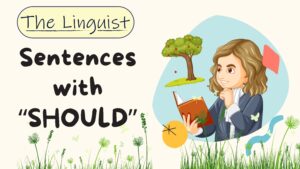
Sentences with Should.
The word “should” is a modal verb used to express advice, obligation, probability, or expectations. It often suggests what is the right thing to do or what is recommended in a particular situation. For example:
– “You should eat healthy food.” (advice)
– “We should arrive by 5 PM.” (expectation)
– “She should have apologized.” (past obligation or missed opportunity).
“Should” can also be used in questions or negatives to seek or deny advice, such as:
– “Should I take this route?”
– “You should not skip your homework.”
It helps us frame polite suggestions and express regret or criticism when combined with “have” (e.g., *”You should have called earlier.”*).
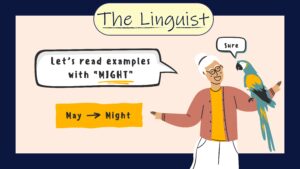
Sentences with Might
Understanding the Usage of Might
The word might is used to express possibilities, permissions, or uncertainties in the present or future. It is softer and more polite than may. When combined with have, it refers to possibilities in the past. Here are examples to understand its usage:
1. **Possibility:** “It might rain today.” This suggests there is a chance of rain but not certainty.
2. **Uncertainty:** “He might not come to the party.” This expresses doubt about his attendance.
3. **Past Possibility:** “She might have missed the bus.” This means it is possible she did not catch the bus.
4. **Polite Suggestions:** “Might I suggest an alternative plan?” This is a courteous way of offering an idea.
By using **might**, we can convey our thoughts more tentatively or politely, making it a valuable addition to both casual and formal communication.
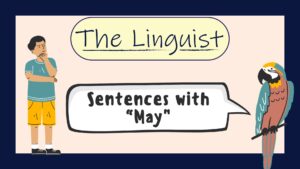
40 examples of MAY
The word “may” is a modal verb that is used in various contexts:
1. Permission: “May I leave early today?” is used to ask for permission politely.
2. Possibility: “It may rain tomorrow” suggests a chance of something happening.
3. Prohibition: “You may not enter the restricted area” indicates something is not allowed.
4. Uncertainty or Doubt: “He may not agree with the proposal” expresses uncertainty.
5. Wish or Hope: “May you always stay happy” conveys a blessing or wish.
6. Hypothetical Situations: “What may happen if we delay this project?” explores possible outcomes.
By focusing on the action or condition, “may” allows speakers to express possibilities, permissions, or restrictions in a concise manner.
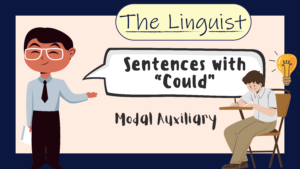
Sentences with “Could”
Sentences with “Could” 1. Affirmative Sentences 1. He could swim when he was five years old. वह पाँच साल की उम्र में तैर सकता

50 Sentences with CAN
Sentences with CAN: 1. Can you help me with my homework? क्या आप मेरी होमवर्क में मदद कर सकते हैं? तुम्ही माझ्या गृहपाठात मदत करू
